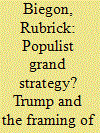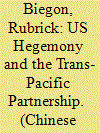|
|
|
Sort Order |
|
|
|
Items / Page
|
|
|
|
|
|
|
| Srl | Item |
| 1 |
ID:
169779


|
|
|
|
|
| Summary/Abstract |
What is the role of ‘populism’ in Donald Trump’s foreign policy? Defining populism as a framing style that constructs antagonisms around ‘the people’ and their adversaries, this article explores Trump’s rhetoric in relation to his efforts to shift US grand strategy away from its traditional investment in the liberal international order. Based on an approach grounded in the ontological commitments of critical discourse analysis, it examines three interlocking frames: (1) the ‘corrupt’ elites of the establishment ‘swamp’; (2) the anti-globalist, ‘America first’ agenda; and (3) poor deal-making responsible for the United States ‘losing’ in international affairs. In responding to declinist themes and anxieties, Trump’s populist rhetoric frames a Jacksonian ideological approach based on nationalism, mercantilism and a reliance on coercive power.
|
|
|
|
|
|
|
|
|
|
|
|
|
|
|
|
| 2 |
ID:
181629


|
|
|
|
|
| Summary/Abstract |
The debates around remote warfare have grown significantly over the last decade, leading to the term acquiring a certain buzz in the media, think-tank, and policy discourse. The lack of any serious attempt to reflect and take stock of this body of scholarship informs the scope of this special issue, in general, and of this article in particular. This paper addresses this former gap and, in doing so, serves a threefold purpose. First, to provide a state-of-the-art review of this emerging debate. Second, to both categorise what properties make a buzzword and to make the case for why existing remote warfare scholarship should be approached in this way. Third, to introduce how the various contributions to this special issue extend the debate’s conceptual, theoretical, and empirical parameters.
|
|
|
|
|
|
|
|
|
|
|
|
|
|
|
|
| 3 |
ID:
189116


|
|
|
|
|
| Summary/Abstract |
This paper argues for the utility of remote warfare as a means of analysing the geopolitics of American primacy. Through the use of new technologies and surrogate forces to address security challenges with a minimal military footprint, remote warfare (re)imposes political distance between the United States and the sites of its military interventions. Its constitutive modalities of intervention range from drones and Special Operations Forces to Private Military Security Companies, security cooperation programmes and emerging technologies associated with Artificial Intelligence. As public support for large-scale overseas interventions has dwindled and strategic competition with China has intensified, remote warfare represents a means of ‘retooling’ US primacy, which is both a structural condition and a strategic orientation. As a strategic approach to the use of force, remote warfare enables the American state to project military power in a more flexible and sustainable manner. This has supported the maintenance of US primacy as Washington’s strategic focus has shifted from counterterrorism towards a renewed emphasis on great power competition.
|
|
|
|
|
|
|
|
|
|
|
|
|
|
|
|
| 4 |
ID:
181633


|
|
|
|
|
| Summary/Abstract |
This paper aims to develop the study of remote warfare’s constitutive “remoteness.” It proposes a novel definition of remoteness as the degree of the American public’s socio-psychological detachment from the realities of political violence fought at a physical distance from the continental United States, as mediated through spectatorship of the use of military force. The remoteness of remote warfare has physical, psychological, and social properties. We argue that it exists on a continuum subject to change over time and should not be approached as a fixed condition measured solely by the physical distance separating combatants involved in armed fighting or as the use of various weapons technologies. The numerous dynamics associated with the remoteness of remote warfare are illustrated through an examination of American military intervention in Libya during Obama’s presidency. From the height of the 2011 NATO intervention in the country onwards, US military operations in Libya became more “remote” for the American public. Whilst other contextual factors contributed toward this outcome, we argue that the diminished spectacle surrounding the 2016 Operation Odyssey Lightning helps explain the American public’s increasing remoteness from military intervention in Libya.
|
|
|
|
|
|
|
|
|
|
|
|
|
|
|
|
| 5 |
ID:
175840


|
|
|
|
|
| Summary/Abstract |
This article provides a critical analysis of the agency of the United States in the Trans-Pacific Partnership (TPP). Building on neo-Gramscian theory, it contextualises the US decision to withdraw from the TPP as an expression of hegemonic crisis. Through an examination of the strategic and geoeconomic logics and objectives of the trade agreement in US foreign economic policy, it maintains that the TPP was intended primarily to expand the structural and consensual power of the United States in the international political economy. Partly an attempt to kick-start a stalled neoliberal agenda, the TPP was also an effort to respond to China’s growing influence in trade governance. The article argues that, despite the revival of the TPP in the form of the Comprehensive and Progressive Agreement for Trans-Pacific Partnership, the inability of elite networks in the United States to implement the original accord is illustrative of a crisis of hegemony driven largely by the collapse of the ‘common sense’ in favour of economic globalisation.
|
|
|
|
|
|
|
|
|
|
|
|
|
|
|
|
|
|
|
|
|